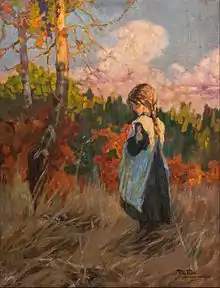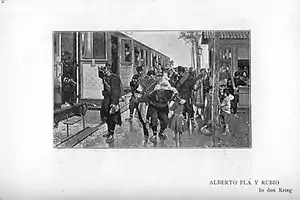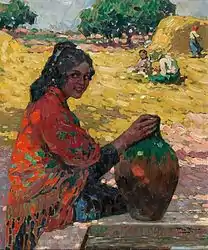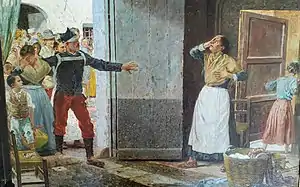Alberto Pla y Rubio
Alberto Pla y Rubio (1867–1937) was a Spanish painter interested in social issues.[1] He was a professor of the Academy of Fine Arts in Valencia, the Academy of Fine Arts in Cadiz and the La Lonja school in Barcelona.
Alberto Pla y Rubio | |
|---|---|
 Rubio's 1920 oil painting Girl in a Field | |
| Born | 1867 Villanueva de Castelló, Valencia, Spain |
| Died | 1937 Barcelona, Spain |
| Nationality | Spanish |
| Education | Real Academia de Bellas Artes de San Fernando, Madrid, Spain |
| Known for | Painting |
Notable work |
|
| Movement | Impressionism |
He was born in Castelló de la Ribera, Valencia. He studied art at the Real Academia de Bellas Artes de San Fernando in Madrid, where he was a pupil of Alejandro Ferrant y Fischermans,[1] and in the workshop of Ignacio Pinazo Camarlench.[2] He won a first-class medal in the National Exhibition of 1895 with a canvas entitled ¡A la guerra! ("Off to War!")[1] and won a second-class medal at the Paris Salon of 1899.[3] He died in Barcelona.
Rubio focused on social themes in a realistic style. He was strongly influenced by Joaquin Sorolla and impressionist brushwork, especially in the use of light in his oil paintings.[4]
His prize-winning painting, ¡A la guerra!, belongs to the Prado, the national art museum of Spain, and currently hangs in the town hall of Alcalá de Henares.[1]
In 2006, his painting The Orange Harvest sold at Christie's for US$16,800.[5]
Gallery
 Monochrome reproduction of Pla's 1895 work A la guerra
Monochrome reproduction of Pla's 1895 work A la guerra Mujer con Cántaro ("Woman with Jug"), Oil on cardboard, circa 1910. 41 x 33 cm[6]
Mujer con Cántaro ("Woman with Jug"), Oil on cardboard, circa 1910. 41 x 33 cm[6] De la Guerra (1897)
De la Guerra (1897)
References
- "Pla y Rubio, Alberto". Museo del Prado (in Spanish). Retrieved 4 September 2016.
- "Alberto Pla Y Rubio". askART. Retrieved 4 September 2016.
- Appletons' Annual Cyclopaedia and Register of Important Events. New York: D. Appleton & Company. 1900. p. 284. Retrieved 4 September 2016.
- "Maestros del realismo en España: Alberto Pla y Rubio". trianarts (in Spanish). 4 October 2011. Retrieved 4 September 2016.
- "Alberto Pla Rubio (Spanish, 1867 - 1937)". MutualArt. Retrieved 4 September 2016.
- Gutiérrez Buron, Jesús (1980). Exposiciones Nacionales de pintura en la España del siglo XIX, vol. II (in Spanish). Madrid. p. 188.
External links
| Wikimedia Commons has media related to Alberto Pla Rubió. |